Free Trade Agreements for Indonesia?
Bilateral and regional agreements are not ideal, but they do offer some compelling benefits.Advertisement
One might argue that regional integration can get in the way of international integration. However, no one can debate that if the member countries are geographically proximate and natural trading partners, then a union would be trade creating.
Indonesia is one country that has been quite active in concluding free trade agreements (FTAs). By July 2012, Indonesia had eight FTAs in effect, six regional and two bilateral (specifically, the ASEAN free trade area, AFTA; ASEAN-Australia and New Zealand, ASEAN-China, ASEAN-India, ASEAN-Japan and ASEAN-Korea FTAs, Indonesia-Japan EPA and Indonesia-Pakistan FTA). These agreements mean that Indonesia has FTAs with trading partners that account for of 67 percent of its total trade. For context, Chile, Peru, and Mexico have FTA coverage ratios of more than 80 percent, while Canada, Singapore and New Zealand are at more than 50 percent.
Asian economies in recent years have been driven by China’s impressive growth, especially since its ascension to the World Trade Organization in December 2001, and by Japan’s focus on Asia. Still, a number of countries with relatively low trade integration question their positions in the Asian factory and the benefits of FTAs for their economies. And it is true that the use of existing ASEAN FTAs has been limited, and predominately by large firms. An economy with relatively low trade integration like Indonesia may only enjoy a modest gain from free trade agreements.
For small economies, though, there at least two positive outcomes to be derived from regional trade agreements. The first is an expansion in investment. While the direct impact on trade might be debatable in the beginning, rising investment usually follows. As an illustration, after the ASEAN-Korea FTA and ASEAN-Japan Comprehensive Economic Partnership took effect in 2010, foreign direct investment (FDI) from Korea into ASEAN roughly doubled between 2011 and 2013, from $1.7 billion to #3.5 billion, while the Japanese figure increased from $9.7 billion to $22.9 billion over the same period. In planning their expansion, American businesses tend to see ASEAN as a single entity rather than as 10 separate countries, and 81 percent of 588 senior U.S. executives operating in Southeast Asia claim that ASEAN integration helped their expansion in the region (AmCham Business Outlook Survey for Southeast Asia, 2015).Diplomat BriefWeekly Newsletter
Get briefed on the story of the week, and developing stories to watch across the Asia-Pacific.Get the Newsletter
Second, regional agreements can drive unilateral domestic reforms. New Zealand is a good example of how a small country has transformed from a highly protected market into one of the most open through parallel unilateral and regional tracks that headed towards a multilateral track (the WTO, 1996). Preferential tariff reductions for Australia did not lead to the collapse of the manufacturing sector in New Zealand, and this encouraged the country to become more open in most tariff lines, not only towards Australia but to the rest of the world. In the case of Indonesia, InaTrade (an online system for obtaining trade-related licenses) and the negative investment list are two products of domestic reforms driven mainly by regional commitments.
Enjoying this article? Click here to subscribe for full access. Just $5 a month.
The bottom line is that Indonesia and its ASEAN peers should advance regional integration as a vehicle for multilateral integration; and to keep regional integration viable, they should adopt an open regionalism (i.e. regional economic integration that does not discriminate against outside countries).
While I am not a big fan of bilateral and regional agreements, they can be an elegant sweetener to attract investments as well as a sophisticated driving force for unilateral domestic reforms, particularly when multilateral negotiations have stalled.
Still, it should be kept in mind that globalization in any form will inevitably be submissive to national domestic objectives, not the other way around.Advertisement
Lili Yan Ing is an economist for Economics Research Institute for ASEAN and East Asia (ERIA) and a lecturer at University of Indonesia. The views expressed are her own.
02
Do free trade agreements really create a level playing field?
As we wait to see what will happen with the renegotiation of the North American Free Trade Agreement (NAFTA), there is always the question of what free trade agreements (FTAs) between countries really mean and whom they benefit: The United States—the market where every country wants to sell its goods—or smaller countries with fewer resources to buy what U.S. manufacturers have to sell?
The Trans-Pacific Partnership (TPP) was one of those questionable free trade agreements that didn’t make sense to me. When I looked at the 11 countries involved in this FTA, I noted in a blog post in October 2015 that it might open Japan’s doors to U.S. imports, but that, given Japan’s reluctance to import U.S. goods, the TPP probably wouldn’t benefit the United States. Australia and New Zealand are good trading partners, too. The rest of those small countries listed in the TPP didn’t appear to offer much in the way of resources to buy many U.S. manufactured goods. The TPP was pretty much a loser for the United States and pulling out of it was a no brainer.
People like to talk about FTAs as deals that will level the global playing field. But free trade agreements always cost something. When looked at closely, will free trade agreements really create a level playing field? Ian Fletcher, author of the book, Free Trade Doesn’t Work, published in 2010, said that while policy makers claim all they want is a “level playing field” and believe that free trade agreements are key to achieving that, they are mistaken. What they want, said Fletcher, is “fair trade,” and he goes on to explain what that looks like. “A true level playing field would require not just equal rules for international trade, but also that nations have the same domestic economic policies, as these can also confer an export advantage,” writes Fletcher. “There are literally thousands of places in an economy where export subsidies can be hidden, from the depreciation schedules of the tax code to state ownership of supplier industries, land use planning, credit card laws, non-performing loans, cheap infrastructure and tax rebates.”
While we read a lot about the automotive industry in Mexico, the aerospace industry has built a manufacturing hub there, as well. When Canadian aircraft producer Bombardier opened an assembly plant at the Queretaro Aerospace Park in Mexico in 2007, it helped put the aerospace industry on the map in that country. According to MexicoNOW, Mexico’s aeronautics parts and components manufacturing industry grew at a healthy pace in recent years. “For the last 10 years, this sector in Mexico has managed to average about 15% annual growth in exports to reach $6.7 billion in 2015,” said the publication. Mexico’s aerospace industry exported $7.6 billion in 2016, 90% of that to the United States.
Trade issues loom large between the three countries. Bombardier “has a long history of relying on government subsidies to compete” with U.S. behemoth Boeing, and these two companies could benefit from an update of NAFTA to help sort out their differences. According to the Information Technology & Innovation Foundation, in a June 12 letter to the Chair of the Trade Policy Staff Committee at the Office of the U.S. Trade Representative, “the subsidies Bombardier received for its C Series aircraft (100- to 150-seat large civil aircraft) were the latest to date and have allowed it to predatorily price its aircraft, thereby displacing potential sales of U.S.-made aircraft around the world.”
The U.S. Department of Commerce initiated an anti-dumping and countervailing duty investigation against Bombardier after receiving a petition from Boeing in May 2017. Boeing argues that “unfair subsidies have allowed Bombardier to predatorily price its aircraft in the U.S. market to the detriment of U.S. companies.” The selling of aircraft below cost is “particularly harmful for an innovative and capital-intensive sector such as aircraft manufacturing, as R&D costs are very high and pricing is set at the time of order, which can be years before the plane is produced.”
Recommendations for a revised NAFTA include getting Canada to permanently withdraw trade-distorting subsidies to Bombardier and to get Bombardier to price its plane at actual market rates.
Boeing had a similar problem with Europe’s Airbus. Boeing has been in a trade dispute with Airbus for more than a decade, with each side accusing the other of accepting billions of dollars in illegal government subsidies and tax exemptions.
Fletcher writes in his book, “Foreign governments often face strong domestic political pressures to keep such subsidies in place, even when they want to strike a deal with the U.S. to eliminate them. . . . But there are thousands of [subsidies] ranging from the Import-Export Bank (cheap loans for exporters) to the Hoover Dam (cheap electricity). And that’s just on the federal level; states and localities constantly bid subsidies against each other to attract businesses. Every tax credit, from R&D and worker training on down, subsidizes something, and if that something is exported, it constitutes an export subsidy.”
Trade agreements don’t always do what people expect them to do and it’s doubtful that many of these deals truly create a level playing field. As Fletcher concludes, “. . . a true level playing field is impossible. And if a level playing field is impossible, then no free-market solution will ever balance trade, and balanced trade will have to be some kind of managed trade.”
03
Tag: EU-Mercosur Free Trade Agreement
Tuesday, July 18th 2023 – 22:46 UTC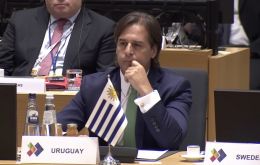
In a strong plea for progress on the Free Trade Agreement between the European Union and Mercosur, Uruguayan President Luis Lacalle Pou demanded an end to decades of fruitless negotiations, urging the involved parties to reach an agreement.Wednesday, July 5th 2023 – 10:59 UTC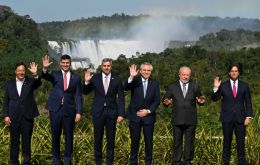
Argentina Tuesday handed over the Pro Tempore Presidency of Mercosur to Brazil and Uruguay refused to sign the joint declaration after the bloc’s 62nd Summit in the Argentine city of Puerto Iguazú in the northeastern province of Misiones.Thursday, June 29th 2023 – 10:42 UTC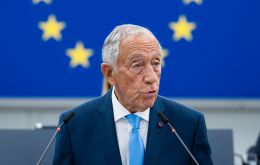
Portugal’s President Marcelo Rebelo de Sousa said Wednesday it was essential that an agreement between Mercosur and the European Union (EU) be concluded as soon as possible, Agencia Brasil reported. Rebelo made those remarks during a forum in Lisbon which was also attended by Brazilian Vice President Geraldo Alckmin, who is also the South American country’s Minister of Development, Industry, Commerce, and Services.Wednesday, June 14th 2023 – 10:55 UTC
France’s National Assembly (Lower House) Tuesday voted 281 to 58 against the approval of the EU- Mercosur trade deal on the grounds that it “may encourage” deforestation, among other issues contrary to the country’s interests, it was reported in Paris.Saturday, June 10th 2023 – 10:34 UTC
France’s Junior Trade Minister Olivier Becht expressed his concerns said this week during his visit to Brazil about concluding the EU-Mercosur deal too hastily. While his country does want a deal concluded between the European Union and South America’s Mercosur, Becht warns against entering into it too quickly, without assurances on environmental and social issues.Monday, April 24th 2023 – 10:59 UTC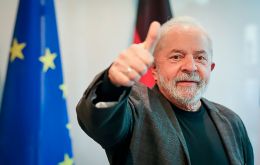
Márcio Elias, executive secretary of Brazil’s Ministry of Development, Industry, Trade, and Services, said Sunday that the federal government intends to close the free trade agreement between Mercosur and the European Union this year.Thursday, April 20th 2023 – 10:59 UTC
Brazilian President Luiz Inácio Lula da Silva’s stance on the war in Ukraine might jeopardize the Mercosur-European Union deal, according to a confidential report drafted ahead of a European foreign ministers’ summit and accessed by Politico.Thursday, March 30th 2023 – 16:24 UTC
France denies blocking the EU-Mercosur agreement, which it vetoed since it was signed in 2019. However, it reiterates its demands to correct it and says it is waiting for the outcome of the negotiations being conducted by the European Commission with its South American partners.Friday, November 4th 2022 – 18:50 UTC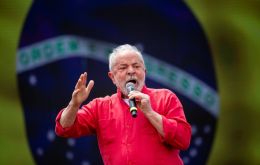
The first clash of the Brazilian president-elect with the European Union occurred, given Luiz Inácio Lula da Silva’s anticipated intention to introduce modifications to the Mercosur/EU trade agreement, discussed for two decades.Wednesday, October 5th 2022 – 10:12 UTC
It’s been more than two decades since the negotiations began. Yet, geopolitical conditions have never been favorable to ratify the agreement between the European Union (EU) and Mercosur. However, the Minister of Foreign Affairs of Uruguay, Francisco Bustillo, said Tuesday during a press conference that there is “a window of opportunity” to ratify the accord between the European and South American blocs in 2023, during the pro tempore rulings of Spain and Brazil in each group.
